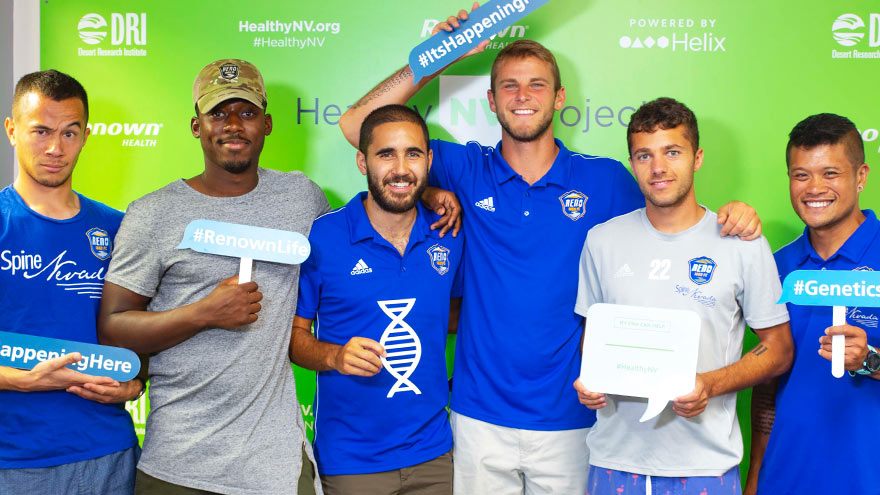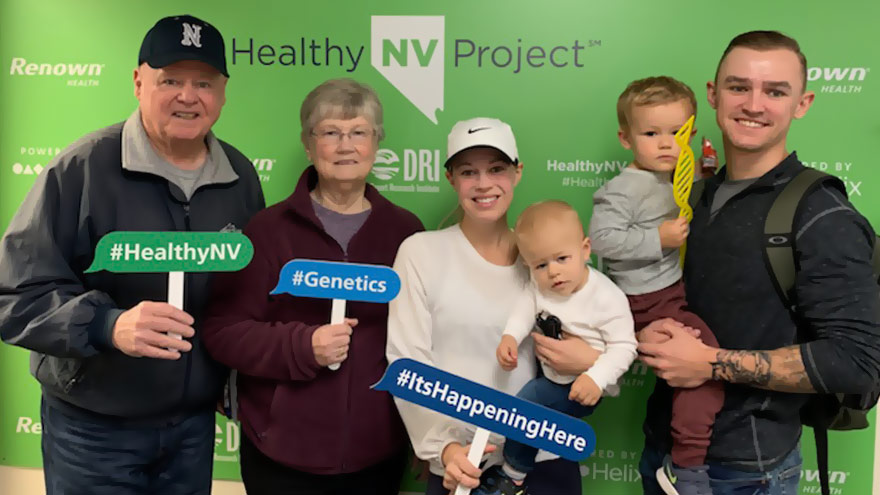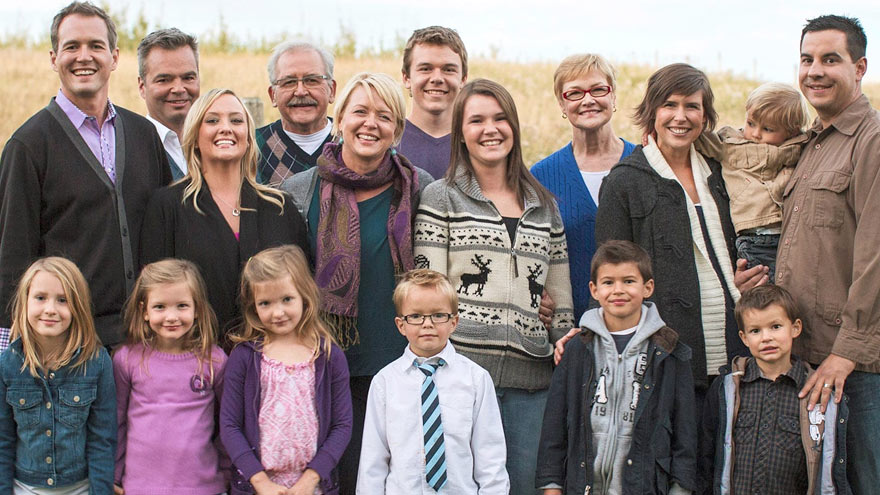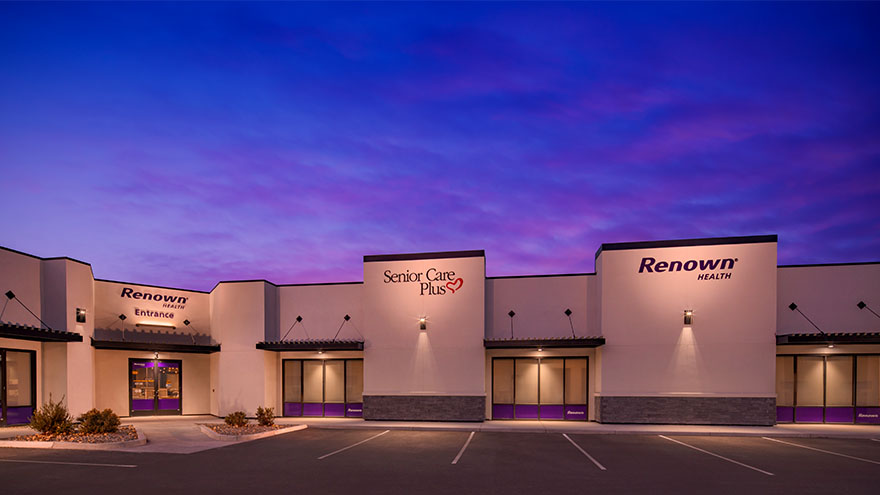Search
-
CEO Blog: Improving Health Through Genetics and Big Data
Renown Health President and CEO Tony Slonim, MD, DrPH, discusses efforts nationwide to develop a more effective and efficient way to deliver care. explains the benefits of Renown Health’s population health study with the Desert Research Institute and 23andMe.
Read More About CEO Blog: Improving Health Through Genetics and Big Data
-
5 Tips to Keep Your Brain Nimble
Not all memory loss is inevitable — there are several things you can do to keep your brain nimble at any age. Find out how brain exercises, a healthy diet and daily movement can improve your brain’s focus. A modest decline in memory is to be expected as we get older. We forget someone’s name but recall it later. We find the need to make lists to remember things more pressing. Manageable? Yes. But frustrating nonetheless. The good news is we don’t have to sit back and succumb to age-related memory loss. There are concrete things we can do at any age to keep our brains sharp, nimble and engaged. Five Simple Brain Exercises 1. Volunteer or participate in meaningful activities outside of work. This engages your brain and emotions in a healthy, positive way. 2. Engage in moderate, regular exercise to tone body and mind. Overall good health is critical to brain health. Even casual daily walking can boost your mental abilities. 3. Eat the rainbow. Choose to include plenty of colorful fruits and veggies and ease up on processed foods in your daily diet. The proper nutrients can improve circulation to your brain, which will amp up your cognitive abilities. Consult your doctor for the best diet and supplement choices for your specific health needs 4. Get a blood test to determine your body’s hormonal and nutrient levels. Specific hormones and nutrients can affect cognition. Be mindful of your cholesterol levels, and if you take cholesterol medications, such as statin drugs, be aware they can also affect your mental faculties. 5. Engage in brain activities like reading, crossword puzzles, Sudoku and Trivial Pursuit. These types of activities can improve your brain’s focus and concentration and — most important — test your memory and general knowledge. You derive more benefit by engaging in these activities consistently for short amounts of time, so make a weekly appointment with yourself to build brainpower.
-
Healthy Nevada Project: What We've Learned
As the Healthy Nevada Project expands to 50,000 study participants, researchers are sharing the health insights gleaned from the pilot phase of the project. Air pollution is a major health factor affecting northern Nevadans, according to data gathered by researchers in the pilot phase of the Healthy Nevada Project, one of the largest population health studies in the country. Today, the project — which began 18 months ago as a partnership between Renown Health and the Desert Research Institute — is expanding to add 40,000 additional participants bringing total enrollment to 50,000 Nevadans. “We are thrilled to share the first insights from our 10,000-person pilot phase and discuss how we will begin using those results to improve patient care,” says Anthony Slonim, M.D., Dr.PH., FACHE, president and CEO of Renown Health and president of Renown Institute for Health Innovation, a collaboration between Renown and DRI. Healthy Nevada Project Pilot Phase — and What Happens Next The pilot phase of the Healthy Nevada Project proved Nevadans are excited to know more about themselves and want to contribute to research that could improve health outcomes for the entire state. The pilot phase enrolled 10,000 participants in less than 48 hours and DNA sample collection from each participant was completed in just 69 working days. Based on pilot phase data, researchers have seen increased use of regional healthcare services correlated with fluctuations in air quality and so-called “bad air events” such as wildfires and atmospheric inversions. In phase two, Renown IHI will evaluate possible links between genetics and increased susceptibility to respiratory ailments. Study researchers also announced care providers and scientists will begin working on a number of clinical programs and scientific studies focused specifically on Washoe County’s high age-adjusted death rates for heart disease, cancer and chronic lower respiratory disease. Collectively, these conditions among local residents stand at 33 percent above the national rate. In the coming months, Renown IHI will begin providing advanced calcium score screenings to pilot phase participants at higher risk for cardiovascular disease. This will allow researchers to examine the link between genetics and calcium buildup in the heart. Researchers are also evaluating future studies focused on age-related macular degeneration and breast cancer risks in northern Nevada. Pilot Phase Insights Fifty percent of pilot study participants responded to a comprehensive, socioeconomic survey, which revealed: High rates of lower respiratory disease in northern Nevada and co-morbidities such as diabetes and hypertension suggest air pollution in northern Nevada is a confounding and significant factor in health. Study participants had parents who died from cancer and heart disease at a higher rate than the age-adjusted national average. Study participants exercised less than recommended by the American Heart Association and expressed interest in receiving help with behavior modification using diet/nutrition and weight loss tools. In phase two, if study participants choose to complete a follow-up survey, they will have the chance to pick an additional health and wellness app specific to their individual genetic results. Learn More To see if you are eligible to participate in the study, to sign up for study updates and for full details on the Healthy Nevada Project, please visit HealthyNV.org.
-
The Healthy Nevada Project Changed My Life: A Local Mom's Story
Read about Jordan Stiteler, a local mom who says the Healthy Nevada Project provided insights into her family’s genetic makeup — and the likely cause of her dad and great grandfather’s deaths. Now she is changing her life due to her new diagnosis of familial hypercholesterolemia, which will allow her to take steps toward preventing the same fate. Jordan Stiteler’s dad died suddenly of a stroke nearly ten years ago — at only 45 years old. His grandfather died at age 40. Now through the Healthy Nevada Project’s no-cost genetic testing, she is closer to understanding why that may have happened. And she can take proactive steps to prevent the unhealthy symptoms that often lead to a stroke and heart problems. After getting her Geno 2.0 by National Geographic ancestry report, Stiteler got a call from Renown Institute for Heart & Vascular Health Cardiologist and Renown IHI Director of Research, Dr. Christopher Rowan. “They told me that I have FH, which is familial hypercholesterolemia,” she said. “I have genetically very high cholesterol because I have a non-functioning gene that doesn’t get rid of my cholesterol like a normal body would.” Familial Hypercholesterolemia: Simple Life Changes Dr. Rowan told Stiteler it is curable with medication and a change in lifestyle. Stiteler has embraced healthy lifestyle changes by exercising more and eating healthier. “It is so important. Being a mom, I think you have so much more to live for. Having this information has changed my life.” Stiteler feels confident FH affected her Dad. “It is helping my family realize that we need to get tested,” she said. “There were big milestones that my Dad missed. He didn’t get to see either of us get married or have our children. That was huge.” She has become passionate about sharing the need to join the Healthy Nevada Project as her way of helping to prevent other families from possibly going through what she and her family did with the early loss of her Dad. In addition to FH results, the Healthy Nevada Project is returning clinical results on BRCA 1/2 (hereditary breast and ovarian cancer) and Lynch syndrome (colorectal and endometrial cancer) to consenting study participants. To sign up for the Healthy Nevada Project, go to HealthyNV.org. Join the Healthy Nevada Project Recruitment for phase two is still open. In addition to opting in to receive clinical results, participants receive National Geographic’s Geno 2.0 ancestry app at no cost. They also have the chance to pick an additional app for health and wellness after completing a follow-up survey. Learn More or Sign Up
Read More About The Healthy Nevada Project Changed My Life: A Local Mom's Story
-
Healthy Nevada Project Returning Clinical Results to Participants
The Healthy Nevada Project – a first-of-its-kind population health study combining genetic, clinical, social and environmental data – has reached another landmark milestone. The study is notifying study participants at risk for familial hypercholesterolemia, BRCA and Lynch syndrome. “I took part in the Healthy Nevada Project to find out my ancestry. I didn’t even realize the test could give me so much information,” says 29-year-old Jordan Stiteler, who was recently diagnosed with familial hypercholesterolemia (also known as FH) through the Healthy Nevada Project. “After my dad passed away suddenly at age 45, I learned I had high cholesterol but I didn’t know it was genetic and I didn’t get an FH diagnosis until last week,” Jordan explains. “I immediately changed my diet, started walking more and doing more cardio. I also set up an appointment with my primary care physician for the first time in a while. I’ve talked with my family and even strangers about testing since my diagnosis. I hope my story will inspire others to test and can save someone’s family from going through the same loss I did.” Healthy Nevada Project Notifying Patients of Familial Hypercholesterolemia Risks Jordan is among the first Healthy Nevada Project participants to receive clinical results from the genetic study led by Renown Institute for Health Innovation (Renown IHI) – a collaboration between Renown and the Desert Research Institute Foundation. This groundbreaking population health study is now reaching out to study participants like Jordan, who asked to be notified of health risks. If study volunteers choose, the project will also provide guidance on treatment and additional testing for family members who may also be at risk. The project is starting with the return of FH risks which is a genetic tie to high cholesterol. Just a few months ago, a paper in the Journal of the American College of Cardiology recommended genetic testing become the standard of care for patients with a definite or probable FH diagnosis. Jordan says she plans to have her young son tested as well. “This is the future of health; not just reacting to sick people, but a coordinated effort between innovative technologies, data-driven researchers, and responsive practitioners to deliver personalized interventions to identify, prevent and treat disease,” says Anthony Slonim, M.D., Dr.PH., FACHE, president and CEO of Renown Health and president of Renown IHI. “As care providers, we often don’t see patients until they’re already sick and that’s a difficult problem. By embracing personal genomics, we can accelerate the ability of researchers to access data and apply those learnings back to our health system sooner.” In the Months Ahead: Notification of BRCA1/2 & Lynch Syndrome Risks The Healthy Nevada Project will start notifying study volunteers at risk for other CDC Tier 1 conditions including hereditary breast and ovarian cancer syndrome (BRCA 1/2 genes) and Lynch syndrome in the months ahead. These conditions are the key focus for the Healthy Nevada Project. The reason: Because early detection and treatment will save lives, and these conditions are some of the most common. “This research allows us to look into cancer, cardiac, respiratory illness and beyond to identify underlying causes, assess real risks and eventually initiate appropriate preventive actions much earlier. Human subject research is often intangible to participants – we are treated as subjects. The Healthy Nevada Project is creating actionable information for our participants while engaging in leading-edge research on health determinants,” said Joseph Grzymski, Ph.D., associate research professor at DRI, principal investigator of the Healthy Nevada Project and chief scientific officer for Renown Health. Landmark Population Health Study Continues to Expand Since launching two years ago, the Healthy Nevada Project has quickly evolved and expanded. The pilot project enrolled 10,000 participants in just 48 hours in September 2016. In March 2018, phase two of project expanded to an additional 40,000 participants with genetic testing partner, Helix. Helix’s genomic sequencing provides participants and researchers greater depth and quality of DNA data. With this, they can gain further insights to improve health. During a recent media roundtable announcing the return of clinical results, the Healthy Nevada Project also announced plans to complete testing of 40,000 people by the end of 2018. This will bring the project’s total enrollment to 50,000 people – approximately 10 percent of northern Nevada’s population. The Healthy Nevada Project hopes to reach more than 250,000 people in its next phase. The ultimate goal is to offer genetic testing to every Nevadan interested in learning more about their genetics and health. Join the Healthy Nevada Project Recruitment for phase two is still open. In addition to opting in to receive clinical results, participants receive National Geographic’s Geno 2.0 ancestry app at no cost. They also have the chance to pick an additional app for health and wellness after completing a follow-up survey. Learn More or Sign Up
Read More About Healthy Nevada Project Returning Clinical Results to Participants
-
Local Organization Receive $250K Build Health Challenge Award
Award given to Truckee Meadows Health Communities, Renown Health & Washoe County Health District. Truckee Meadows Healthy Communities (TMHC), Renown Health and the Washoe County Health District received the BUILD Health Challenge® award, a $250,000 grant to support Caring For Reno’s Elders (C.A.R.E.) program. The award comes as a collaborative result of more than 30 local organizations submitting a proposal for the funding. Renown Health announced that the organization is matching the grant alongside other pledged funding from the community, bringing the current C.A.R.E. support to $580,000. Together the entities will focus on senior loneliness and the health issues it creates. The partners are honored that Truckee Meadows was selected as one of 18 communities to receive funding from BUILD in the 2019-2021 term. “C.A.R.E will be a community approach to enhance life quality for elders by reducing social isolation and loneliness, issues that seriously impact senior health,” said co-team leader Kindle Craig, Sr. Director Renown Institutes. “Loneliness is the root cause of many issues including suicide1 , chronic disease2 and a reduction in lifespan3 . Washoe County senior suicide rates are two and four times the national rate for those aged 65 and 85 years, respectively4 . That is unacceptable.” Sharon Zadra, TMHC executive director and co-team leader, said this project will tackle barriers to socialization such as access to affordable housing, transportation and healthcare. “We’ll bring the entire community on-board, long-term, to increase social connectedness and reduce health and mortality issues associated with loneliness by starting a cross generational ‘Kindness Epidemic,’” Zadra said. The BUILD Health Challenge is a national program focused on bold, upstream, integrated, local and data driven projects that can improve community health. The award provides funding, capacity building support and access to a national peer-learning network to enhance collaborative partnerships locally to address our community’s most pressing health challenges. The C.A.R.E team expresses special thanks to the BUILD Health Challenge for its support of this initiative. “Loneliness and isolation in our senior population leads to declines in both mental and physical health, and increased mortality,” said Kevin Dick, Washoe County District Health Officer. “We are incredibly honored to join the BUILD cohort, teaming with TMHC and Renown Health to bring long-term solutions by building a cohesive social network to improve the health of our elders.” The BUILD Health Challenge® is made possible with the support of: BlueCross BlueShield of South Carolina Foundation, the Blue Cross and Blue Shield of North Carolina Foundation, Blue Shield of California Foundation, Communities Foundation of Texas, de Beaumont Foundation, Episcopal Health Foundation, The Kresge Foundation, Methodist Healthcare Ministries of South Texas, Inc., New Jersey Health Initiatives, Robert Wood Johnson Foundation, and W.K. Kellogg Foundation. TMHC, Renown Health and WCHD have worked united for the last five years, rallying diverse partners and community leaders to influence and advocate for the region’s capacity to ensure a healthy community.
Read More About Local Organization Receive $250K Build Health Challenge Award
-
How to Fight Cancer that Runs in the Family
Your mother had breast cancer. Your uncle had colon cancer. A cousin has stomach cancer. Could yours be the next name to make the family cancer list? “Possibly,” says Dr. Robert Nathan Slotnick, MD, PhD, Medical Geneticist at Renown Medical Group. In this article, the doctor discusses the genetics behind Lynch syndrome — and how you and your family can fight it. What is Lynch Syndrome? Lynch syndrome, also known as hereditary non-polyposis colorectal cancer (HNPCC), is one of the most common genetic conditions known to increase cancer risk in individuals and families. It enables colon and other cancers to develop by causing mutations in mismatch repair (MMR) genes. “The genes MLH1, MSH2, MSH6, PMS2 and EPCAM normally help to repair damaged DNA,” explains Dr. Slotnick. “But when they don’t work properly, naturally occurring DNA replication errors are not repaired efficiently. These errors accumulate and cancer can be the result.” Colon cancer is just one of many possibilities. People with Lynch syndrome also have a higher risk of developing endometrial cancer (cancer of the inside lining of the uterus) as well as cancer of the ovaries, stomach, pancreas, kidney, brain, and bile duct, among others. These syndrome-enabled cancers often appear in patients before the age of 50. Family Cancer Clues The family connection to cancer is a strong one notes the doctor. “Cancer is best considered a genetic disease because it is always tied to changes (or mutations) in our inherited material: our DNA,” says Dr. Slotnick. “These DNA changes cause cells to lose control of their normal constraints on growth and metabolism and can allow abnormalities to develop.” “Although all cancers are genetic,” he adds, “not all cancers are hereditary or passed down through generations.” But because Lynch syndrome IS a hereditary condition, personal and family cancer histories provide invaluable information toward diagnostic confirmation and to a path of surveillance, prevention and treatment. Once a strong family history of cancer is confirmed, doctors and geneticists can move forward with targeted genetic testing to identify specific gene mutations. If Lynch syndrome is diagnosed, testing can also reveal your risk for associated cancers. And your results could be a wake-up call to family members. According to the Centers for Disease Control and Prevention (CDC), close relatives of people with Lynch syndrome have a 50% chance of having similar gene mutations and a higher risk of cancer. The good news is detection and prevention progress is being made. “Lynch is just one of many cancer syndromes where risk is tied to heredity,” explains Dr. Slotnick. “In the last few years, our ability to identify those at risk for this type of cancer predisposition has improved markedly, both in diagnostic accuracy and cost. This allows us to provide aggressive surveillance and prevention choices to individuals and families at risk. Healthier families and lower cost: it’s a win-win.”
-
Staying Heart-Healthy with Genetic Screening
February is American Heart Month. While cardiac care is crucial every time of year – especially as heart disease stays the number one killer in the United States – American Heart Month serves as a great reminder to stay on top of your heart health. We spoke with Malina Ruiz, a cardiology nurse practitioner at Renown Health, on three key ways to embrace heart-healthy living and how genetic screening can help inform you of certain genetic risks that can play a role on the cardiac life stage. 1. Invest in a heart-healthy diet. Eating a diet that is rich in fruits, vegetables, whole grains and healthy fats (including monounsaturated fats such as avocados and polyunsaturated fats such as sunflower oil) is a key defense in protecting your cardiac health, according to Malina. While you are filling your plate with these nutritious foods, remember to keep an eye on your saturated and trans-fat intake, and try limiting foods that are high in those fats. “No matter what age we are, maintaining a heart-healthy diet will always be important,” said Malina. Need help finding cardiac-friendly meals? The National Heart, Lung and Blood Institute makes it easy with heart-healthy recipes and tips from experts. 2. Do an exercise audit. “Keeping an active lifestyle during our younger years is one of the most important factors that affect heart health in future years,” said Malina. Maintaining a regular exercise regimen that allows you to raise your heart rate and break a sweat can help prevent future cardiac events. A good rule of thumb is to aim for 150 minutes a week of moderate-intensity exercise, which averages out to 30 minutes a day on 5 days out of the week. It’s never too late to start a regular exercise routine! Exercise doesn’t have to be something you dread – leverage American Heart Month to find activities that you enjoy. The American Heart Association can help you discover new ways to move your body. At the end of the day, as Malina emphasizes, “any movement is better than nothing!” 3. Don't skip those check-ups. Regular preventative visits with your primary care provider can help you identify possible risk factors for heart conditions before they start actively affecting your life. “Check-ups become even more important as we age, along with being aware of the signs and symptoms of heart disease, heart attack and stroke,” added Malina. There’s no time better than the present – call our expert scheduling team today at 775-982-5000 to request a preventative check-up with your primary care provider.
Read More About Staying Heart-Healthy with Genetic Screening
-
Taking Control of Her High Cholesterol and Health
In 2018, Jordan Stiteler became a Healthy Nevada Project advocate. Her DNA results revealed that she had Familial Hypercholesterolemia (FH). FH is a genetic condition that can cause high cholesterol. Since then, Jordan’s taken action to lower her cholesterol and make her family aware of this potentially dangerous condition. Read Part I of Jordan’s story Taking Control of High Cholesterol Looking at Jordan, an active young mother, you would never suspect she has high cholesterol. However, because of FH, Jordan’s cholesterol levels are unusually high. She chose to take action when learning of her FH gene, in order to maintain her long-term health. Jordan started by exercising more and eating healthier. “I’ve definitely been checking all the labels to see if the food has a lot of cholesterol, trans fats, or saturated fats,” she explains. She now eats a 100% plant-based diet which helps to lower her cholesterol naturally. Additionally, Jordan partnered with Dr. Michael Bloch, a lipid specialist, to monitor and manage her cholesterol. She told Dr. Bloch that she and her husband were planning on having a second baby. With this in mind, he helped Jordan create a plan to accommodate her pregnancy. Several months after giving birth to her beautiful daughter Logan, it was time to revisit her cholesterol treatment plan. Dr. Bloch prescribed Jordan a statin called Lipitor. It successfully cut her total cholesterol by half in just three months. “I had blood work done in November 2019 and my total cholesterol was 293 (normal is less than 199). I started taking cholesterol medication in February 2020. I had blood work done in June 2020 and my total cholesterol was 149, ” Jordan shares. “My LDLs went from 219 to 78! I am so grateful that the medication worked so well and so quickly! It’s a weight lifted off of my shoulders.” Although Jordan no longer limits herself to a strictly vegan diet, she is mindful of what she eats and how it affects her cholesterol. She’s thrilled that her cholesterol is now at a healthy level!
Read More About Taking Control of Her High Cholesterol and Health
-
Nonalcoholic Liver Disease and Genetics: Is There a Link?
What exactly is the relationship between genetics and disease? Powered by Renown Health, the Healthy Nevada Project is one of the most visible genomic studies in the United States. They are recruiting participants here in northern Nevada to understand the relationship between genetics and nonalcoholic liver disease. Joseph Grzymski, Principal Investigator at the Healthy Nevada Project and Chief Scientific Officer at Renown Health, shares why this study is so important and who should take part. Many people are aware that heavy drinking can lead to liver disease. Yet they are unaware that other types of liver disease are not caused by alcohol consumption. These types of liver disease are more difficult to diagnose but are equally dangerous. What is NASH? A build-up of fat causes nonalcoholic Fatty Liver Disease (NAFLD) in the liver. The most dangerous form is called Nonalcoholic Steatohepatitis (NASH). It causes inflammation and damages liver cells, leading to fibrosis, scarring of the liver, and decreased liver function. If NASH goes untreated, irreversible liver damage can occur, leading to cirrhosis, cancer, or liver failure. These conditions can be fatal. What’s most concerning about NASH is that the symptoms don’t typically cause pain and aren’t noticeable. The good news is that a new local study is raising awareness about this disease by recruiting at-risk people for NASH. Am I at risk for developing NASH? The following factors put you at risk: Obesity Type 2 diabetes Metabolic syndrome High blood lipids, such as cholesterol and triglycerides Does having a family member with nonalcoholic liver disease increase my risk? We do not know a lot about inheriting NASH, although a lot risk factors run in families. One goal of this study is to better understand the genetic component of NASH. There are certainly other risks too, such as environmental and behavioral risk factors. However, we don’t yet have a good grasp on how these impact NASH risk. How is NASH diagnosed? Diagnosis is traditionally done with either a liver ultrasound or biopsy. However, both procedures are expensive and the invasive biopsy has risks. Therefore doctors often use risk factors or less invasive blood tests for diagnosis. This NASH study will include a new blood test called the enhanced liver function (ELF) test. Doctors and researchers have data suggesting that the ELF test is a better diagnostic test for NASH risk. Conducting this cutting-edge test with study participants allows them to share results with their doctors to ensure the best care. What can I do to reduce my NASH risk? Limiting exposure to the risk factors of NASH often lowers risk. Eating a healthy diet, maintaining a recommended weight and exercising regularly can proactively lower your risk.
Read More About Nonalcoholic Liver Disease and Genetics: Is There a Link?
-
5 Benefits of Medicare Advantage Plans
If you are approaching age 65, you may be starting to think about the government benefits you will soon qualify for. For example, your healthcare option to elect between Original Medicare or a Medicare Advantage plan. What’s the difference? Original Medicare comes in two parts: Part A and Part B. Part A covers a portion of hospitalization expenses, and Part B applies to doctor visits and medical expenses, such as lab tests and some preventative screenings. A Medicare Advantage plan, also known as Part C, is an “all-in-one” alternative to Original Medicare. These “bundled” plans include the benefits of Part A, Part B and Part D (prescription drugs). Some people choose a Medicare Advantage Plans over Original Medicare because these plans offer coverage like vision, hearing, dental and more. Saves You Money First and foremost, Medicare Advantage Plans save Medicare members money –and not just a little bit of money, but a lot of money. Original Medicare only pays 80% of the cost of medical care – the Medicare beneficiary is responsible for the other 20%. A Medicare Advantage Plan is different. The Medicare Beneficiary is only responsible for a small copay, typically less than 20% of a doctor visit or procedure. More importantly, Medicare Advantage Plans have a maximum out-of-pocket amount, meaning that once you reach the limit, the Plan pays 100% of all medical services. That alone can save thousands of dollars per year – particularly if there is a hospitalization involved. Dental, Vision and Hearing Coverage What sets Medicare Advantage plans apart is the additional benefits provided that Original Medicare doesn’t cover. These benefits include dental coverage, vision coverage, hearing exams and hearing aid coverage. None of these important health care benefits are included in Original Medicare. Also, most Medicare Advantage Plans include prescription drug coverage at no additional cost, while individuals with Original Medicare need to sign-up and pay extra for Part D prescription drug coverage. Medicare Advantage Plans offer more benefits than Original Medicare and they help members save on their health care costs. Focus on Accessibility, Wellness and Preventative Health Accessible healthcare coverage is key to staying on top of your health. To join a Medicare Advantage Plan you must have Part A and Part B coverage and live in the plan’s service area. It is important to remember that Original Medicare is only valid in the United States. Fortunately, many Medicare Advantage Plans offer worldwide emergency coverage. Another important healthcare consideration to keep in mind is Medicare Advantage Plans focus on your overall well-being. They offer preventative and wellness-related benefits at no cost to you. This includes important benefits like free over-the-counter medicines and free gym memberships. You won’t find those types of benefits with Original Medicare. Medicare Supplement Plans (Medigap) Some people confuse a Medicare Supplement Plan, also known as a Medigap Plan, with Medicare Advantage Plans. They are different and the biggest difference is Medicare Supplement plans come with ever-increasing premiums because they are based on your age. This means the cost of these plans increase every year. Plus, they don’t offer any supplemental benefit coverage like vision, dental or hearing. That’s not the case with a Medicare Advantage Plan. In many cases, there is no monthly premium and you receive all manner of supplemental benefits. These benefit-rich, zero-dollar premium Medicare Advantage plans are enticing people to say goodbye to pricy Medicare supplement plans and hello to Medicare Advantage Plans. Don’t worry, if you join a Medicare Advantage Plan for the first time and you aren’t happy with the plan, you’ll have special rights under federal law to buy a Medigap policy and a Medicare drug plan if you return to Original Medicare within 12 months of joining the Medicare Advantage Plan. The Flexibility to Change Your Mind A common misconception about Medicare Advantage Plans is that when you join, you are still on Medicare and are not giving up your Medicare coverage. Medicare Advantage Plans are considered “Medicare Part C.” This means they combine your Medicare Part A (hospital coverage), Part B (doctor’s coverage) and Part D (prescription drug coverage) into one convenient package that costs less and provides more. You can only join, switch or drop a Medicare Advantage Plan during the enrollment periods: Initial Enrollment Period: When you first become eligible for Medicare, you can sign up during your Initial Enrollment Period. For many, this is the seven-month period that begins three months before the month you turn 65, includes the month you turn 65, and ends three months after the month you turn 65. General Enrollment Period: If you have Part A coverage and you get Part B for the first time during this period (between January 1 - March 31 each year), you can also join a Medicare Advantage Plan. Your coverage may not start until July 1. Annual Election Period: Between October 15 and December 7, anyone with Medicare can join, switch or drop a Medicare Advantage Plan. Your coverage will begin on January 1 (as long as the plan receives your request by December 7). Medicare Advantage Plans have been around for more than 25 years and continue to grow in popularity. In some parts of the country, more than half of all Medicare beneficiaries are enrolled in a Medicare Advantage Plan. Only 40% are enrolled here in Nevada, but that number is growing every year.
-
A Facility Designed with Seniors in Mind
Did you know that members of Senior Care Plus, the largest Medicare Advantage Plan in northern Nevada, have access to an exclusive, senior-focused Renown Health primary care office right here in Reno? The facility – and the Medicare plan itself – are both designed with seniors in mind; this includes specialty staff, longer appointment times, on-site services, supportive furniture and more. 4 Benefits of an Exclusive Senior Care Plus Facility Centrally Located with Senior-Focused Staff The Senior Care Plus facility, located on Del Monte Lane, is only open to members of Senior Care Plus. This exclusive access means that the bilingual staff – including doctors, medical assistants, nurses and personal assistants – works daily with aging health needs. On-Site Services and Enrollment Specialists The Senior Care Plus providers understand that seniors often require complex care management and geriatric-focused services. That is why this location offers on-site lab draws, saving travel time and stress. Another essential service this location offers is longer appointment times, ensuring members don’t feel rushed when discussing their health needs with providers. Another perk of the Del Monte location – on-site enrollment specialists. Members, and potential members, can stop by this location on weekdays between 9 a.m. and 4 p.m. to have their SCP-related questions answered. Furniture Designed with Seniors in Mind Senior Care Plus makes a doctor visit as stress-free as possible. The office has furniture that makes each visit more comfortable for members. All of the office chairs have armrests, so seniors can easily get in and out of them. Also helpful are the exam room chairs with remote controls for reclining the chair and lifting the patient’s legs. This makes exams, such as a diabetic foot exam, less of a strain. Community Rooms Social connections are an important part of health. That is why the Del Monte Lane office has community rooms used for informative seminars and as a gathering place for members to mingle. The seminars focus on many interesting topics for older adults, such as diabetes, COPD, asthma, weight loss, nutrition, yoga and chair exercises.











